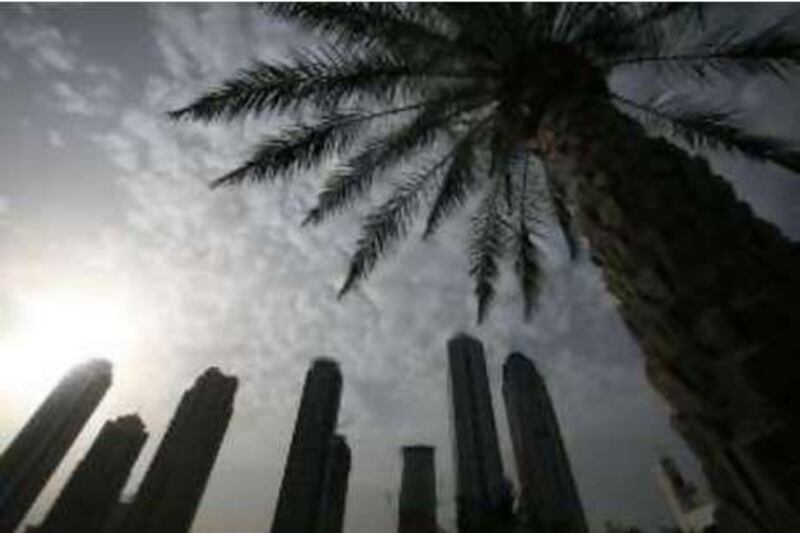It would be easy to think the UAE has lifted the curse of resource wealth. Hardly a day goes by without a gleaming new testament to economic diversity. Today a golf course, tomorrow a new fleet of aircraft, the next day an investment bank or aluminium smelter. The oil resources are being recycled into other sectors, building a sustainable economy that will last long after the last drop of oil has been extracted. But only a fool would ignore the spectre of bloated bureaucracies, white-elephant industrial projects and crippling subsidies that casts a constant shadow on oil-reliant economies.
Prompted by a sharp decline in its oil production, Dubai has led the way in rebalancing its economy from hydrocarbons to tourism, trade, finance and aviation. Even in Abu Dhabi, the UAE's oil heartland, latest figures show non-oil exports grew faster than imports in the first quarter, indicating that here, too, the balance is slowly shifting. But high oil prices are deceptive. By providing more money to invest in alternatives, oil windfalls can lull policy makers into thinking they are escaping the clutches of the black gold, when all they are actually doing is sowing the seeds of future collapse by funding loss-making ideas and building inefficient governments. Last month, a major regional study found that productivity in the UAE has actually declined in the past eight years.
Increasing productivity is essential to future prosperity, if and when oil prices or production fall. Economic growth has been strong for many years, but the sunny figures are mostly the result of importing labour, which has been made possible by high oil revenues, according to the joint study by the Conference Board, a research outfit, and the Gulf Investment Corp, an investment house owned by six GCC nations. In the UAE, the labour force has grown at a rate of 7.1 per cent per year, but productivity has declined by 0.1 per cent. Removing oil prices from the equation paints an even bleaker picture, with productivity declining by 0.5 per cent every year. The UAE has the lowest productivity gains in the GCC since 2000.
Some might argue that Abu Dhabi, and the UAE, can afford to ignore inefficiency because its resource base is so huge, with more than a century of oil at current production rates. Inflation is no problem because the Government can just raise public sector wages, as it did in November with a 70 per cent increase. It can insulate its population from the cost of high oil prices by keeping a tank of petrol below Dh80. It can afford to subsidise water and power, and even turn the desert green with huge irrigation projects. But all of these solutions only dig the Government deeper into an unsustainable economic model that has been shown to fail, time and time again.
The world is littered with examples of such misguided projects, set up with windfalls from previous commodity booms. Venezuela, the world's top oil exporter for several decades before the rise of the Gulf, has a legacy of loss-making industrial projects along its Orinoco River. In Nigeria, once hailed as the great hope for Africa, mothballed aircraft from the bankrupt national carrier litter Lagos airport and rebels claiming a share of the resources threaten to break up the country.
No country is immune from oil's pernicious effects. It requires little or no work to get out of the ground, but fills state coffers with cash, encouraging lax spending and inflation. In many cases windfall oil revenues strengthen a country's currency - a phenomenon known as the "Dutch disease", named after the decline in Dutch industry in the 1970s after the discovery of natural gas. In turn, a stronger currency raises the cost of doing any other business and acts as an obstacle to diversification. In the UAE, one consequence of the fixed peg to the dollar has been the avoidance of this aspect of the resource curse.
The success of Dubai's transition from an oil economy is a remarkable example of a government which has known how to combine the benefits of a competitive private sector with protection for strategic industries, while keeping corruption to a minimum. But the battle against the resource curse for the nation as a whole is far from over. Is there really room for two world-scale airlines within 140km of each other? Or two world-scale aluminium smelters? Would the smelters still be viable if they were fuelled with imported gas? Exposing domestic markets to competition and benchmarking the state against the private sector are essential steps in building sustainability into diversity. At a time when the Government has enough cash to buy the whole stock market, this is ironically the moment it should be selling state assets and allowing a greater role for entrepreneurs to ensure a sustainable economic future.
tashby@thenational.ae





